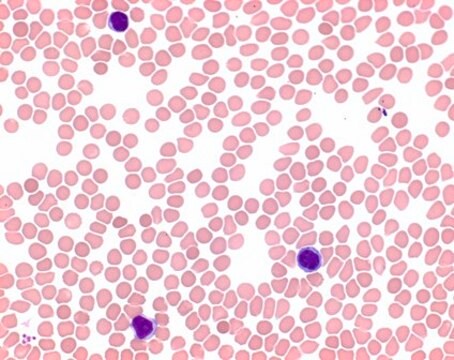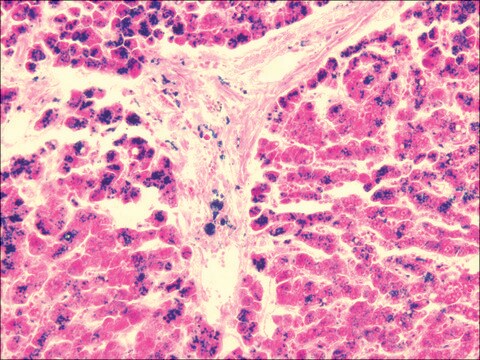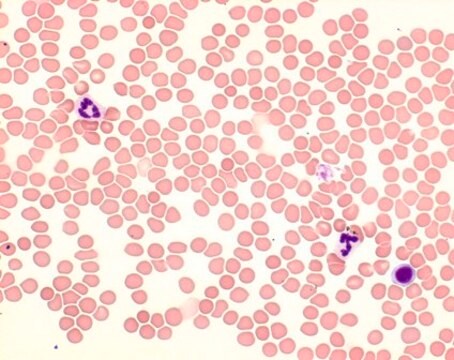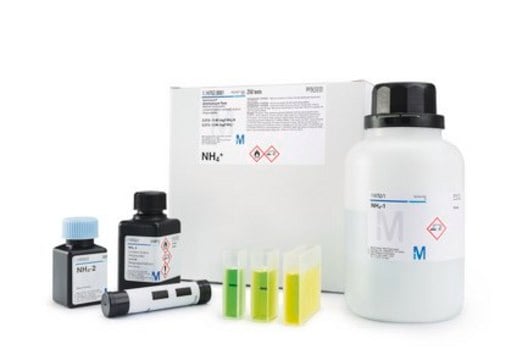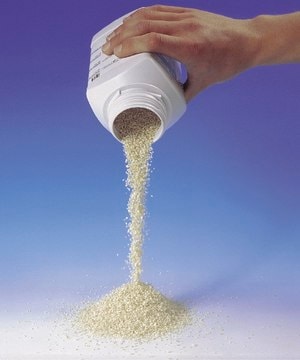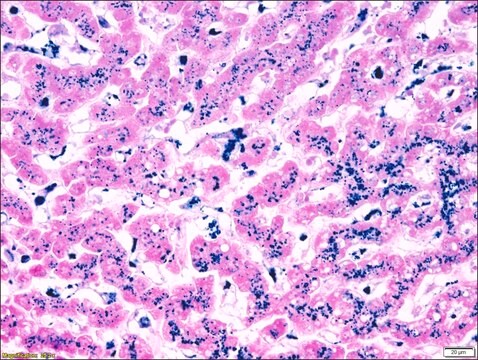1.12084
HEMATOGNOST Fe™
staining kit for the detection of free ionic iron (Fe³⁺) in cells
Zaloguj sięWyświetlanie cen organizacyjnych i kontraktowych
About This Item
Kod UNSPSC:
41116121
NACRES:
NA.21
Polecane produkty
Poziom jakości
IVD
for in vitro diagnostic use
Zastosowanie
clinical testing
diagnostic assay manufacturing
hematology
histology
temp. przechowywania
15-25°C
Opis ogólny
HEMATOGNOST Fe™ - staining kit for the detection of free ionic iron (Fe3+) in cells, is used for human-medical cell diagnosis and serves the purpose of the hematological and histological investigation of sample material of human origin. HEMATOGNOST Fe™ is a staining kit for performing the so-called Prussian blue (Berlin blue) reaction in hematological and histological specimen material. This staining kit contains all the reagents necessary for the detection of free ionic iron. In the Prussian blue reaction, ionic iron (Fe3+) not bound to the heme structure reacts with potassium hexacyanoferrate(II) in hydrochloric solution. It precipitates as an insoluble complex salt in the blood, bone-marrow, or tissue cells and thus localizes free cellular iron: 4 Fe3+ + 3 K4Fe(CN)6 = Fe4[Fe(CN)6]3 + 12 K+
As a measure to achieve the best possible visual differentiation of the iron deposits in the cytoplasma, this is counterstained with nuclear fast red solution (Nuclear fast red-aluminum sulfate solution 0.1% (Product number 1.00121), resulting in a tender pink color. If further, more detailed information on the cell morphology is required, counterstaining with any of the other familiar “classical” methods such as Giemsa, (Giemsa, Product number 1.09204), May-Grünwald (May-Grünwald eosin methylene blue solution, Product number 1.01424), hemalum (Mayer′s hemalum solution, Product numer 1.09249), etc. can also be employed.
The Prussian blue reaction can also be used to stain specimens already stained by one of these classical procedures for the additional detection of iron. Repeat counterstaining is not necessary in this case.
The staining kit is sufficient for 6 - 8 stainings with up to 16 slides. The staining kit is developed and registered as CE / IVD product for applications in diagnostics. For more details, please see instructions for use (IFU). The IFU can be downloaded from this webpage.
As a measure to achieve the best possible visual differentiation of the iron deposits in the cytoplasma, this is counterstained with nuclear fast red solution (Nuclear fast red-aluminum sulfate solution 0.1% (Product number 1.00121), resulting in a tender pink color. If further, more detailed information on the cell morphology is required, counterstaining with any of the other familiar “classical” methods such as Giemsa, (Giemsa, Product number 1.09204), May-Grünwald (May-Grünwald eosin methylene blue solution, Product number 1.01424), hemalum (Mayer′s hemalum solution, Product numer 1.09249), etc. can also be employed.
The Prussian blue reaction can also be used to stain specimens already stained by one of these classical procedures for the additional detection of iron. Repeat counterstaining is not necessary in this case.
The staining kit is sufficient for 6 - 8 stainings with up to 16 slides. The staining kit is developed and registered as CE / IVD product for applications in diagnostics. For more details, please see instructions for use (IFU). The IFU can be downloaded from this webpage.
Komentarz do analizy
Potassium hexacyanoferrate II (Reagent 1): 4.5 - 5.5 %
Hydrochloric acid (Reagent 2): 4.5 - 5.5 %
Density (Reagent 3 d 20 °C/4 °C): 1.040 - 1.060
Suitability for microscopy: passes test
Hydrochloric acid (Reagent 2): 4.5 - 5.5 %
Density (Reagent 3 d 20 °C/4 °C): 1.040 - 1.060
Suitability for microscopy: passes test
Informacje prawne
HEMATOGNOST FE is a trademark of Merck KGaA, Darmstadt, Germany
This page may contain text that has been machine translated.
Hasło ostrzegawcze
Danger
Zwroty wskazujące rodzaj zagrożenia
Zwroty wskazujące środki ostrożności
Klasyfikacja zagrożeń
Eye Dam. 1 - Met. Corr. 1
Kod klasy składowania
8B - Non-combustible, corrosive hazardous materials
Klasa zagrożenia wodnego (WGK)
WGK 1
Temperatura zapłonu (°F)
Not applicable
Temperatura zapłonu (°C)
Not applicable
Certyfikaty analizy (CoA)
Poszukaj Certyfikaty analizy (CoA), wpisując numer partii/serii produktów. Numery serii i partii można znaleźć na etykiecie produktu po słowach „seria” lub „partia”.
Masz już ten produkt?
Dokumenty związane z niedawno zakupionymi produktami zostały zamieszczone w Bibliotece dokumentów.
Nasz zespół naukowców ma doświadczenie we wszystkich obszarach badań, w tym w naukach przyrodniczych, materiałoznawstwie, syntezie chemicznej, chromatografii, analityce i wielu innych dziedzinach.
Skontaktuj się z zespołem ds. pomocy technicznej